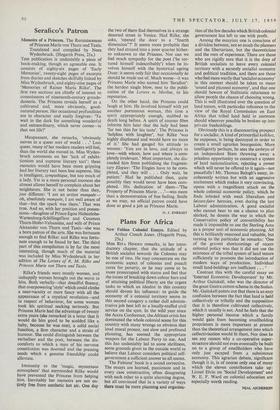Serafico's Patron
Memoirs of a Princess. The Reminiscences of Princess Marie von Thurn und Taxis.
Translated and compiled by Nora
Wydenbruck. (Hogarth Press, 21s.) THIS publication is undeniably a piece of book-making, though an agreeable one. It consists of eighty-six pages of 'Early Memories', twenty-eight pages of excerpts from diaries and sketches skilfully linked by Miss Wydenbruck, and eighty-nine pages of 'Memories of Rainer Maria Rilke'. The first two sections are chiefly of interest to connoisseurs of nineteenth-century grande- damerie. The Princess reveals herself as a cultivated and, more obviously, good- natured person. Her occasional profundities are in character and easily forgiven: 'To wait in the dark for something wonderful and extraordinary, which never comes—is that not life?'
Maupassant, she remarks, 'obviously moves in a queer sort of world . . .' Less queer, many of her modern readers will feel, than the world she moved in. Miss Wyden- bruck comments on her 'lack of exhibi- tionism and supreme literary tact': these memoirs would have been more gripping had her literary tact been less supreme. She is intelligent, sympathique, but too much of a lady. Yet in a more personal moment she almost allows herself to complain about her neighbours. She is not better than they, just different: 'I am an artiste manquee- oh, absolutely manquee, I am well aware of that—but the spark was there.' That was true. And so, with her position and posses- sions—daughter of Prince Egon Hohenlohe- Wartenburg-Schillingsfiirst and Countess Thurn-Hofer-Valsassina, and wife of Prince Alexander von Thurn und Taxis—she was a born patron of the arts. She was fortunate enough to find Rilke: and Rilke was fortu- nate enough to be found by her. The third part of this compilation is by far the most interesting, though much of the material was included by Miss Wydenbruck in her edition of The Letters of R. M. Mike and Princess Marie von Thurn and Taxis.
Rilke's friends were mostly women, and unhappily women brought out the worst in him. Both verbally—that dreadful fluency, that overpowering 'style' which could clothe a near-vacuity or mere fancy with all the appearance of a mystical revelation—and in respect of behaviour, for some women took his spiritual necking seriously. But Princess Marie had the advantage of twenty extra years (she remarked in a letter that it would do him good to be scolded like a baby, because he was one), a solid social function, a firm character and a strain of humour. She could distinguish between the verbaliser and the poet, between the dis- comforts to which a man of his nervous constitution was doomed and the pressing needs which a genuine friendship could alleviate.
Immunity to the 'magic, mysterious atmosphere' that surrounded Rilke would have prevented the Princess from helping him. Inevitably her memoirs are not en- tirely free from aesthetic hot air. One day the two of them find themselves in a strange deserted street in Venice. Had Rilke, she asks, 'opened the door to a "fourth dimension"?' It seems more probable that they had strayed into a poor quarter hither- to unknown to the Princess. Nor can we feel much sympathy for the poet ('he tor- tured himself indescribably') when he in- volves himself with the hysterical ageing Duse: it seems only fair that occasionally he should be made use of. Much worse—it was Princess Marie who named him 'Serafico': the hardest single blow, next to the publi- cation of the Letters to Merline, to his reputation.
On the other hand, the Princess could laugh at him. He involved himself with yet another portentous woman, this time a spirit appropriately enough, stabbed to death long before. A spirit of coarser fibre informs him later that the lady had been 'far too thin for his taste'. The Princess is `helpless with laughter', but Rilke 'was highly displeased and would have no more of it.' She had gauged his attitude to women: 'You are in love, and always in love—with whom, how and where is com- pletely irrelevant.' Most important, she dis- suaded him from publishing the fragmen- tary Elegies: The Elegies have to be com- pleted, and they will . . . Only wait, be patient.' Had he published then, quite possibly they would never have been com- pleted. His dedication of them—`The Property of Princess Marie . ..'—was more than a demonstration of fine feeling. Smile as we may, no official patron could have done as good a job as Princess Marie.
D. J. ENRIGHT






































 Previous page
Previous page